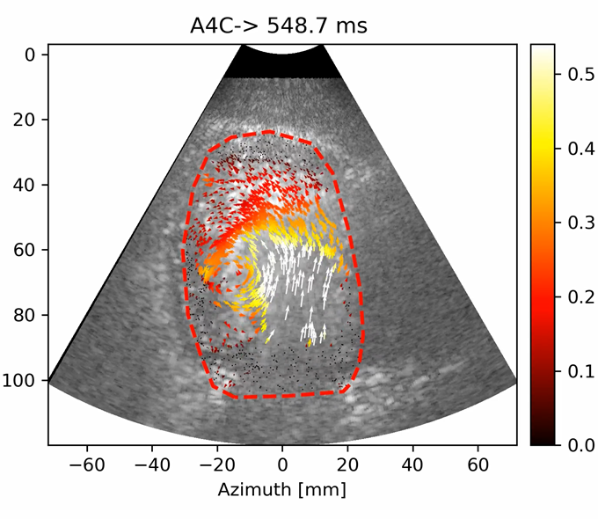MSc thesis project proposal
Conditioning Navier-Stokes based velocity field regularization with sparse high-fidelity data
Project outside the university
EMCEcho-particle image velocimetry (echoPIV) is a VFI method that tracks the motion of intravenously injected microbubbles (ultrasound contrast agent) over time to estimate the blood velocity field. We have shown previously that echoPIV can accurately estimate the blood velocities in the heart. However, the resulting velocity fields are often corrupted by noise and/or dropouts, thus requiring regularization. Regularization of velocity fields is classically done with naïve Gaussian smoothing kernels which tend to over-smooth jet-like flow structures, resulting in underestimation of the true velocity magnitudes.
A novel approach to regularization of these time-resolved velocity fields is to fit the data with physically informed models, such as the Navier-Stokes and continuity equations. However, when using these models we have noticed that the high velocity flows during ventricular filling and ejection are over-dampened. A work around could be to insert high fidelity data from the high velocity regions into the fitting process, so that the final solution preserves these regions. This can be achieved with pulsed-wave doppler estimates or by using echo-particle tracking velocimetry (which tracks a sparse distribution of individual microbubbles).
The objective of this study is to develop and assess the efficacy of supplementing physics informed regularization models with sparsely located high fidelity velocity data. The desired outcome is a smooth velocity field without over-damping of high velocity flow structures.
This project is in collaboration with Hans Bosch and Janson Voorneveld from Erasmus Medical Centre
Assignment
1 Develop pipeline for integrating pulse-waved doppler / particle tracking velocimetry sparse velocity estimates as input to regularization model.
2. Develop an in vitro or in silico experimental setup to assess performance of supplementing sparse velocity estimates.
3. (Optional) Assess performance with in vivo left ventricular datasets.
Requirements
· Background in biomedical engineering, physics or similar.
· Knowledge of imaging processing and signal processing techniques.
· Programming experience in Matlab and Python. Optional: knowledge of tensorflow API.
Last modified: 2021-12-27
